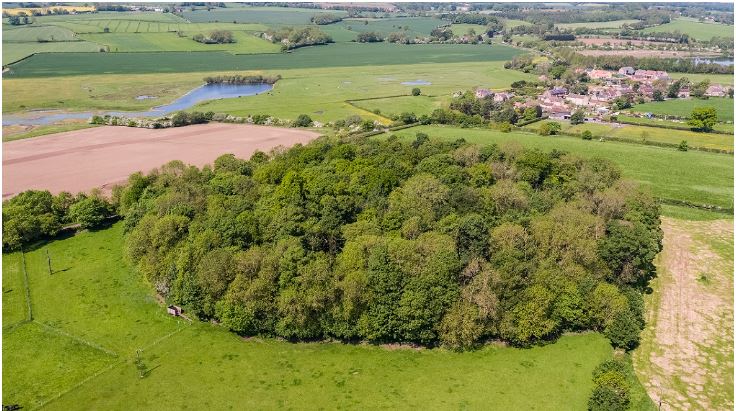UK rural property: Holistic thinking
The Knight Frank Rural Property and Business Update – Our weekly dose of news, views and insight from the world of farming, food and landownership
11 minutes to read
Opinion
It’s tempting to lament the lack of joined up thinking between the various governments of the UK over future support for farmers as highlighted below, but I think that’s just too big an ask. Instead, I’m going to ponder topically why we can’t look at flood mitigation in a more holistic way. My own north Bedfordshire village is bordered on one side by the Great Ouse, which for time immemorial – albeit probably exacerbated in past decades by the creation upstream of new settlements like Milton Keynes and the rise of more extreme weather events – has flooded spectacularly cutting off one of the main routes into the village. Not much that can be done about that, but behind the village is a bowl of arable fields that occasionally becomes totally saturated, funnelling huge volumes of runoff water into the settlement and causing serious damage to homes. Much of the chat from the Environment Agency and local council is about event management – what to do in the event of a flood, but little consideration seems to be given to addressing the problem at source. Water sits on the fields even in summer so drainage is clearly an issue, but given the current emphasis on paying for natural capital and public goods, why not, potentially with support from the insurance companies, pay the farmer to turn the fields over to woodland, which would significantly increase their water-holding capacity and help sequester a bit of carbon? Policymakers are great at headline-grabbing targets but seem far less able to create coherent grass roots strategies that might deliver them.
Do get in touch if we can help you navigate through these interesting times. You can sign up to receive this weekly update directly to your email here.
Andrew Shirley Head of Rural Research
In this week's update:
• Commodities – Egg worries
• Scotland – Direct support confirmed
• Holiday lets – Planning required
• Overseas workers – Deadline soon
• Horticulture – Government rejects plan
• Politics – Green Tory manifesto
• BNG – Nat cap overage clause option?
• Out & About – Linking rural and commercial
• International news – Topsy turvy in France
• Sold – Henges of the north reunited
• Fore! – Essex leisure opportunity
• £1m postcodes – Going rural
• Development land – Market stabilises.
• Farmland prices – 2023 ends on a high
• Country houses – 2023 better than expected
• The Rural Report – Watch the videos
Commodity markets
Commodities – Egg worries
Despite fields across the country remaining waterlogged, the bad weather is not providing any short-term support for cereal prices with feed wheat values continuing to slide. However, November futures prices of £187 are now available for those looking to sell forward. Lower cereal prices are generally good news for livestock producers, especially feed-hungry pig and poultry businesses, but it remains to be seen if the current falls will be enough to help the UK’s egg sector. An NFU survey has revealed that almost a quarter of producers are unsure if they will still be in business by next year.

Need to Know
Scotland – Direct support confirmed
Scottish farmers have welcomed confirmation that most of the support cash they receive will still be in the form of direct payments. First Minister Humza Yousaf told delegates at NFU Scotland’s annual conference last week that at least 70% of the country’s post-Brexit four-tier support scheme, which will kick in from 2026, would be paid to farmers directly. Tiers 1 and 2 of the scheme are designed to support farming activities, albeit with certain sustainability conditions attached. The balance of payments will be for additional environmental activities such as peatland restoration or tree planting.
Farmers in Wales, who are becoming increasingly agitated due to a perceived lack of support from the Welsh Assembly, said the Scottish plans underlined the naivety of Wales’s Sustainable Farming Scheme proposals, which place much more emphasis on the environment. A survey by CLA Cymru found only 3% of farmers trust the devolved government. Lake District farmer and author James Rebanks also commented on X that English livestock producers could be at a disadvantage compared to their counterparts north of the border who will still be receiving headage payments.
Holiday lets – Planning required
Landowners considering renting out residential properties as short-term lets will have to apply for planning consent under new government proposals, Housing Minister Michael Gove announced this morning. “In some areas, too many local families and young people feel they are being shut out of the housing market and denied the opportunity to rent or buy in their own community,” he said. Landlords will also have to sign up to a register of short-term lets. Primary residences let out for fewer than 90 days a year will be exempt from the new rules.
Overseas workers – Deadline soon
Any rural businesses looking to recruit overseas workers have until April 4th to beat a new salary threshold deadline. From that date any workers coming to the UK under the skilled worker route will have to earn at least £38,700, compared with the current bar of £26,200.
Talking points
Horticulture – Government rejects plan
Food security is a hot topic at the moment and while the UK is relatively self-sufficient in meat and grains the fruit and vegetable supply chains are considered much more fragile. There was therefore disappointment across the horticultural industry when the government last week chose to reject a number of the key recommendations contained in a report on the sector – Sowing the seeds: A blooming English horticultural sector – published by a House of Lords committee last November. The main priority from the report was for the government to publish its long-awaited Horticulture Strategy for England “to set direction for the sector and give growers confidence”. However, in its response Defra refused to commit to a specific strategy. It said: “We already take a strategic approach that focuses our research on taking action on the issues most important to the sector.”
Politics – Green Tory manifesto
However, last week the Conservative Environment Network (CEN) did launch a manifesto with a series of recommendations to support farmers wanting to help the environment. Ploughing Ahead includes the following suggestions of particular relevance to farms and estates:
• Abolish Inheritance Tax on farmland which is delivering benefits for nature as part of ELMs or private nature markets by extending Agricultural Property Relief
• Accelerate plans to extend permitted development rights to farmers wishing to convert farm buildings into shops selling their produce and extend permitted development rights to the construction of new slurry stores, medium-sized on-farm reservoirs, and small-scale glasshouses
Even if adopted by Chancellor Jeremy Hunt, it looks unlikely that the proposals will be enough to help the Conservatives in the forthcoming general election. A new poll by the CLA suggests they could win just 43 of England’s 100 most rural constituencies, against the 96 they currently hold.
BNG – Nat cap overage clause option?
As reported here last week, biodiversity net gain is now mandatory for most new residential and commercial property developments. I was therefore interested to see an update from a firm of lawyers pondering on the prospect of applying environmental overage clauses to the sale of rural properties. It is not uncommon to see development overage causes included where the purchaser has to share some of the profits from a future windfall, like the sale of some of the land in question for a new housing development, with the vendor. But doing the same with income from environmental schemes looks much more complicated as there won’t necessarily be any formal change in ownership to trigger such a clause.
Something to keep an eye on. Do get in touch with our Farms & Estates team if you are thinking of a sale.
Out & About – Linking rural and commercial
I was delighted to join a panel of my commercial research colleagues last week discussing the latest property investment trends. Given the event was held the day after biodiversity net gain became mandatory for property developers in the UK it was a good opportunity to highlight the importance of farmland to the entire property industry, not to mention society as a whole. To many, even experienced property professionals, agricultural land is still a little understood real estate asset class, when in fact it is undoubtedly the world’s most important. Thanks to Emma Barnstable for this great summary of the event.
International news – Topsy turvy in France

Mass farmer protests in France have been hogging the headlines, but the Rural Update’s foreign correspondent – aka James Shepherd, a partner in our Bishop’s Stortford Rural Consultancy team – reports on a more gentle, yet pointed, campaign in the south-west of the country. “Farmers say the government and EU are turning their lives upside down, so they have turned every sign upside down across the entire region,” notes James. “I’ve seen hundreds of them.”
Property News
Sold – Henges of the north reunited

One of the UK’s most important neolithic sites has been finally brought back together as a whole following the sale of the most northerly of the three Thornborough Henges to English Heritage. Dating from 3000 to 2500 BC, the seven-acre site in North Yorkshire has been reunited with two other henges, the first time they have been in combined ownership for at least 1,500 years. Knight Frank’s Claire Whitfield who helped handle the sale said: “Reuniting this remarkable ancient monument under single ownership is tremendously gratifying. The northern henge has been exceptionally well preserved by its previous owners and will be an outstanding addition to the nation's heritage assets now cared for by English Heritage.”
Fore! – Essex leisure opportunity

Our Bishop’s Stortford Rural Consultancy team has an exciting opportunity that could appeal to a rural entrepreneur looking to start a new leisure business on a former golf course. The team is renting 30 acres of irrigated land at Clays Lane, formerly the nine-hole Loughton Golf Course, which also includes a hardstanding car park and the footprint of a club house, restaurant, bar, pro shop and auxiliary storage that were demolished after a fire at the property in 2021. “The property offers a commercial opportunity for a long-term lease allowing for the development of a new business venture which could include the redevelopment of the existing building footprint,” says my colleague Henry McNeil Wilson, who is helping to handle the deal.
Our Latest Property Research
£1m postcodes – Going rural
New research from my colleague Tom Bill has identified the latest postcodes where at least 20% of homes are selling for over £1 million. Despite the slowdown in residential markets, 11 areas in England crossed the threshold in 2023 and, on average, they were 66 miles from central London compared with 56 miles in 2022. Unsurprisingly, a large proportion of the locations were in the Home Counties, but a number were in properly rural areas including Ambleside in Lancashire (LA22) in the Lake District National Park, Southwold (IP18) in Suffolk, Broadway (WR12) in the Cotswolds and the EX3 area of Exeter that includes Topsham. Read Tom’s full analysis.
Development land – Market stabilises.
Newly released figures from the Knight Frank Residential Land Index show that England greenfield and urban brownfield values were flat in Q4 2023 compared with the previous quarter. Previously, urban brownfield values had fallen by 20% since the most recent peak of the market in the first quarter of 2022 up to Q3 last year, with greenfield down 17% during the same period. Greater economic confidence and a slowdown in the rise of build costs helped underpin values, says my colleague Anna Ward. Read her full report for more numbers and insight.
Farmland prices – 2023 ends on a high
The Q4 2023 instalment of the Knight Frank Farmland Index has now been published. The average value of bare agricultural land rose by 2% in the final quarter of the year to break the £9,000/acre barrier for the first time. Annual growth was 7%, which outperformed a number of other asset classes. Our research suggests values may flatten out this year, but supply remains limited and demand robust. Read the full report for more insight and analysis.
Country houses – 2023 better than expected
Kate Everett-Allen, our international residential research guru, has added the country homes market to her portfolio and has a bit of good news to report. “Prime country house prices declined by 5.8% in 2023. While this figure represented a sizable correction after two stellar years of growth, the rate of decline was lower than our forecast of -7% for the year. A growing sense that mortgage rates are at, or close to their peak, began to influence market sentiment towards the end of the quarter – a theme we expect to build this year. That’s not to say prices and sales volumes will bounce back strongly. Although the Bank of England opted to hold interest rates at 5.25% in December, the cost of borrowing remains at a 15-year high.” Read Kate’s full report.
The Rural Report – Watch the videos!
You've read the book, now watch the videos! To complement the thought-provoking articles contained within the 2023/2024 edition of The Rural Report our whizzy Marketing team has also created a series of videos featuring many of the report's contributors. Head to our very own YouTube channel to discover more about biodiversity net gain and regenerative farming; find out how we are helping Guy Ritchie's Ashcombe Estate on its diversification journey; and read about the travails of an entrepreneurial Zimbabwean searching for a farm for his family. Plus, lots more.